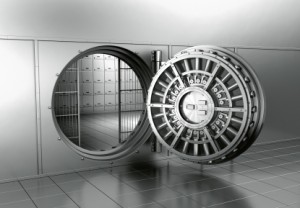 Q:
Q:
Archive for the ‘Uncategorized’ Category
Monthly Payments & Credit Score Q & A
Thursday, April 22nd, 2010Should You Join the Move Your Money Movement?
Wednesday, April 21st, 2010 In December 2009, consumers fed up with high credit card interest rates and the seemingly anti-customer practices of “too-big-to-fail” banks launched the “Move Your Money” movement. And it seems to be taking hold.
In December 2009, consumers fed up with high credit card interest rates and the seemingly anti-customer practices of “too-big-to-fail” banks launched the “Move Your Money” movement. And it seems to be taking hold.
However, the shift began even before this launch. Membership at credit unions grew by 2% in 2009. As of February 55% of community banks and credit unions reported that they had seen an increase in new deposit accounts.
Credit card interest rates are one reason for the switch. A study last summer showed that credit card interest rates at the 12 largest credit unions averaged 3-4% less than interest rates at the 12 largest banks. And, unlike banks, Federal Credit Unions must adhere to an 18% cap on interest rates – whether for credit cards or consumer loans. As we’ve seen, the big banks have no cap on the interest rates they can and will charge.
But there’s more. Small banks and credit unions also tend to pay more interest on deposits and often run specials to attract new depositors. And since credit unions are member-owned nonprofit organizations, they also pass surplus profits back to their customers in the form of dividends and low fees.
Another advantage to moving to a small bank or credit union is personal service. These institutions pride themselves on getting to know their customers. So if you appreciate being greeted by name when you enter your bank, moving your money might please you.
The move isn’t for everyone…
If you rely on the services that only a large national bank can offer, you may be frustrated by banking with a smaller institution.
For one thing, you could find yourself having to use another bank’s ATM when you want to withdraw money. Fees for that service run from $1 to $3 for every withdrawal. However, most of these smaller institutions do belong to an ATM network that provides fee-free access at over 25,000 locations nationwide. You just have to keep track of which banks belong to this Co-Op Network.
Customer service, while friendlier, probably won’t be available 24 hours. In fact, if you need to contact customer service, you may be limited to calling between 9 and 5, Monday through Friday.
Not all small banks and credit unions offer full service online. Some do, some don’t, and some charge for the service. So if you enjoy online bill paying and mobile banking, check for availability before you make the switch.
As with any financial decision – get all the details before you act. Along with fees and practices, be sure to check the details associated with the credit cards they offer.
CreditScoreQuick.com
Credit Report Collection Q & A
Monday, April 19th, 2010 Q:
Q:
I’m confused about the 7 year guideline. Does that mean any item that is on my credit report and is more than 7 years old have to be removed or do I have to dispute the item and hope that it is removed. For example, a credit card with a balance that has been in default since 1999.
Thank you,
Jeffrey
A:
Hi Jeffrey,
Typically most collections are only suppose to be on your credit report for 7 years from Collection date. Unfortunately they don’t always get removed properly. There are some collections that stay on your credit report longer than 7 years. Here is how long certain collections stay on your credit report. Collection Expiration periods.If you find your collections on your credit report has expired, you can use our on-line credit dispute link to dispute them and get them removed from all 3 credit bureaus.
CreditScoreQuick.com
Students – Give Serious Thought to Your Credit Rating Now
Monday, April 19th, 2010 For today’s students, leaving school with good grades and a degree isn’t good enough.
For today’s students, leaving school with good grades and a degree isn’t good enough.
In addition to your scholastic achievements, you need good credit scores if you want to land a good job and find somewhere to live.
As laid-off workers across the country have learned over the past months, employers are using credit scores as a way to thin the growing lists of applicants hoping to fill a dwindling list of job offerings. In most cases, your credit rating isn’t relevant to the job, but if it’s poor, many potential employers will still use it to knock you out of the running for employment.
In addition, rental managers now use credit scores to evaluate tenant applicants – and turn down individuals whose credit reports don’t measure up to their standards.
If you’re in this predicament, you aren’t alone. Thousands of students share your pain.
In some cases, poor credit scores came from confident over-spending in anticipation of high future income. That confidence is probably why so many students were caught in the credit card meltdown.
You remember it – it was when credit card issuers suddenly decided to hike interest rates and slash credit lines without giving warning. It was when consumers who owed $2,000 on a $5,000 credit line suddenly learned that their credit line was now $1,500 and they were over limit.
Even if that didn’t happen, the increased interest often raised minimum monthly payments to levels that were hard to maintain – especially for students who were working part-time. And of course, using nearly 100% of a credit line lowers scores.
If you’re a student with low credit scores, begin taking action right away. Building good credit scores when you aren’t able to hold down a full-time job can take a while.
The first step is to know your credit scores. Order your free online credit report with scores and see how you stand. Your report will include the reasons why your score is less than it could be – even if it’s already good. Armed with that information, you can begin to build your credit.
Since 70% of all credit reports have errors, be sure to read the report carefully and take steps to correct any that you find.
One more thing: If you’ve gotten in over your head and can’t make minimum monthly payments, see a credit counselor for help in negotiating lower payments.
Stay away from credit repair services. They can’t do anything you can’t do, but they will get you further in debt.
Author: Mike Clover
CreditScoreQuick.com
Bad Credit? You Can Still Carry a Credit Card
Thursday, April 15th, 2010 Credit cards have become almost necessary to our way of life now. They’re essential for everything from purchasing gasoline when the station is closed, to shopping on line, to paying for an emergency trip to the dentist.
Credit cards have become almost necessary to our way of life now. They’re essential for everything from purchasing gasoline when the station is closed, to shopping on line, to paying for an emergency trip to the dentist.
But if you’ve gotten into financial difficulties that sent your credit scores to the basement, you may think your only choices are a pre-paid card or a secured credit card.
Not so. Several companies offer “Bad credit credit cards.”
When these were first introduced, many referred to them as “fee harvester” cards, because the fees associated with getting and using them could amount to as much as 75% of the credit line issued. There were fees for making application, fees for activation, annual fees, monthly fees, fees for every transaction, and more.
But the CARD Act took care of that. Under the new regulations, card issuers can charge only up to 25% of the credit line in fees during the first year.
In addition, card issuers began to see the opportunity in serving the thousands of Americans whose credit scores have fallen victim to the economic crisis. As a result, the forces of competition took over.
Now consumers can choose from an array of credit cards for bad credit, many of which offer rates and terms that are similar to cards for consumers with better credit scores. Before choosing one of these credit cards, do the research and find the card with the least cost to you. There can be wide differences.
For instance, Orchard Bank offers a card with a zero percent introductory rate, changing to 14.9% after about 6 months. The annual fee is $39. Credit One Visa® offers a card with 23.9% interest, an enrollment fee of $69, and a $69 annual fee. **
Both of these cards carry the standard fees for balance transfers and ATM withdrawals, and penalty fees for late or over limit charges.
The credit line you’ll be offered will depend upon just how low those scores are. In some cases, the credit line offered could be as low as $200.
But if your goal is to rebuild your credit, it could be worth your effort and expense to carry the card. By charging less than $60 on a $200 limit credit card, then paying off the balance before you use it again, you will begin to see your credit scores inching upward.
** Rates as found stated on line as of April 2010
Author:Mike Clover
CreditScoreQuick.com

Great Payment Record But Low Credit Scores – What Gives?
Wednesday, April 14th, 2010 Do you pay your credit card balance in full each month, refrain from adding new cards, and have a squeaky clean record – yet still have credit scores lower than you’d like?
Do you pay your credit card balance in full each month, refrain from adding new cards, and have a squeaky clean record – yet still have credit scores lower than you’d like?
Your use of rewards credit cards may be the culprit.
Rewards cards can get you all sorts of benefits. And whether it’s travel “miles” you’re after or the cash back, using the card for all your everyday purchases gains you benefits that you wouldn’t get by paying cash.
There’s just one problem. Your credit report only shows the balance on your statement at the end of the month. It doesn’t show that you paid that balance in full and this is a new balance. Thus, it appears that you’re carrying a large balance from month to month.
The amount of credit you use in relation to the amount you have available on each card accounts for about 30% of your total FICO score. And if that balance – on even one card – amounts to more than about 30% of your credit line, your credit score is suffering for it.
When you come close to maxing out a credit line, it can drop a 680 FICO score by as much as 30 points.
When you order your free online credit report with scores, you’ll be advised as to the reasons why your scores are lower than they might be. If your credit card balances are too high, the report will tell you.
Be sure to read your report carefully, because mistakes could be a second reason. If so, correcting them will improve your scores.
So what can you do about it? First, you can attempt to have your credit line increased to allow for a nice cushion between your spending and your available credit. That might not be as easy as it once was because the guidelines are stricter since the passage of the CARD Act of 2009. Card issuers are required to consider your ability to pay if you utilized the entire new credit limit. Thus they’ll be looking at your debt to income ratio as well as your current credit score.
You can also spread your spending between 2 or 3 different rewards cards – which could very well be wise if you’re after cash rather than travel miles. Different cards offer higher rewards for specific kinds of purchases, so you could earn more cash back by keeping track of which card to use where.
If your credit scores aren’t high enough to allow for an increase or a new card, try not charging for a few months to allow your scores to increase naturally. Then go back and add one thing at a time. Remember that requests for new credit can lower your scores, so if you want to add a card, do your research ahead of time and only apply for the card that will serve you best.
Author: Mike Clover
CreditScoreQuick.com your online credit resource.

How to Get the Lowest Mortgage Interest Rates
Wednesday, April 14th, 2010First and foremost, you need good credit scores. So if you don’t know yours, order your free credit report with scores and see where you stand.
If you see a number lower than the high 700’s, carefully note the reasons why given with your online credit report and get to work on making necessary changes. Be sure to go over it carefully to find any errors that could be affecting your credit scores. If you find one or more, contact the credit bureau to correct them.
If you have any late payments in your history, start making all payments on time and wait for 6 months before making a home mortgage application.
Begin paying down your credit card debt, and shift your liabilities so that no card shows more than 50% usage. Meanwhile, don’t apply for any new credit cards or consumer loans.
While you’re doing this, work hard to build at least a 20% down payment.
The higher your credit scores and the larger your down payment, the better mortgage interest rate you’ll be offered.
But that’s not all… once you become a “most desirable borrower,” you’ll also be in a position to shop around and to negotiate.
Most consumers don’t realize that different mortgage lenders offer different programs, and very few realize that yes, you can negotiate with lending institutions.
Make the necessary calls so you know what the best deal really is, then use that information to negotiate with the lender you prefer.
Lenders who want your business are likely to negotiate on the interest rate, the points, and various fees that are routinely tacked onto your loan closing costs. For instance, some banks ask you to pay their attorney’s fees. Tell them about another lender who doesn’t charge this fee and ask that it be removed.
Document preparation fees are included in most loans, but a lender who wants to keep you can drop it all the way to zero.
If you’re required to pay a loan application fee, ask that it be credited back if you accept their loan. Note that not all mortgage brokers charge an application fee.
Remember that the interest rate is just one part of the big picture and every dollar you pay in fees is a dollar you can’t put toward the down payment. But do pay attention to the interest rate and the points. Ask how many points you would need to pay to bring your interest rate down. Then have the mortgage broker show you the real numbers. Compare their figures to rates/points quoted by other lenders.
The first step is knowing your credit scores, so order your free credit report with scores right now and get started.
CreditScoreQuick.com
Debt Collection Tactics Can be Downright Terrifying
Tuesday, April 13th, 2010 The economic crisis shows no favors to those who have always been responsible. Between job losses and the ever upward spiraling costs of basic necessities such as food and heat, thousands of citizens who have always paid their bills find themselves unable to do so.
The economic crisis shows no favors to those who have always been responsible. Between job losses and the ever upward spiraling costs of basic necessities such as food and heat, thousands of citizens who have always paid their bills find themselves unable to do so.
Enter the debt collector.
These come in three varieties:
- The collector representing your original debtor
- The collector representing a third party who has purchased your debt
- The collector trying to bully you into paying a debt you do not owe
The collector representing your original debtor will probably be the least frightening. He or she may offer to help you set up a repayment plan, or offer to settle the debt for a lesser amount if you can pay it off in a lump sum.
To many, that offer seems ridiculous. If they had the money to pay a lump sum, they would have kept up with the payments!
These collectors can become aggressive, however. They can file for a court judgment against you, which could result in money taken from your bank account, a garnishment of your wages, or a lien placed on your property.
State rules vary with regard to property, so you should check with your state’s Attorney General’s office to see which of your assets is safe. And remember, debt collectors aren’t allowed to touch bank accounts if the only money in them is your Social Security Retirement or Disability, or Veteran’s Disability.
Third Party and Bogus Collectors are the ones who often become vicious.
While non-payment of debt is a civil matter, not a criminal matter, they may even threaten to have you thrown in jail.
This is a completely false threat and consumers who act quickly to get a name and contact information from their caller can use it to get them thrown in jail. Fraud and harassment are criminal offenses. Report any such contact to the Federal Trade Commission or the State Attorney General.
Other illegal tactics include talking to your friends about your debt, publishing your debt, threatening bodily harm or using profanity, and calling you before 8 a.m. or after 9 p.m. Some collectors have even threatened consumers with loss of child custody or deportation. These threats are also false and illegal.
What could be worse than this behavior? Using it to try to collect debts you don’t owe.
Some bogus collectors search old records and will try to collect debts that were never yours, debts that were discharged in bankruptcy, or debts that have passed the statute of limitations in your state.
If you think such a debt is valid and you want to settle it, first demand written proof that the debt is yours.
CreditScoreQuick.com your resource for credit reports, credit cards, loans and credit news.
When a Pre-paid Credit Card is Better Than a Secured Credit Card
Thursday, April 8th, 2010 When you choose the right prepaid credit card, it can be a better choice than a secured card. It all depends upon your purpose in getting the card, and as with all credit cards, the benefits to you depend upon the card you choose.
When you choose the right prepaid credit card, it can be a better choice than a secured card. It all depends upon your purpose in getting the card, and as with all credit cards, the benefits to you depend upon the card you choose.
One reason why you might want a pre-paid credit card is that you can have your paychecks deposited directly to your account – eliminating the wait for mail time and eliminating check-cashing fees.
The pre-paid card is essentially a debit card that isn’t tied to a checking account. So you may have access to all of your money. Some cards do require that you maintain a minimum balance.
While a secured credit card is a benefit in that helps you build your credit scores, in order to do so you must treat it just as you would any other credit card – by using only about 30% of your available credit. And since your own money is the security for that credit, it means your funds are tied up.
And, with a secured credit card, any charges you make and don’t repay immediately begin collecting interest. In addition, you may be required to pay an annual fee.
The difference:
If you want a credit card that helps you build your credit scores and allows you the convenience of Internet shopping, reserving a rental car, or purchasing gas when the stations are closed, you need a secured credit card.
If you want a credit card that you’ll use as a substitute for a checking account with a debit card, you need a re-loadable pre-paid credit card.
But don’t just apply for the first card you see. That can lead to paying the kind of fees that eat your money faster than you can deposit it.
Before you make application: Do your research.
Each seems to have a different mix of features, so compare the various offerings and decide which features will offer you the greatest convenience and the lowest cost.
We here at creditscorequick.com have chosen a handful of prepaid cards that we feel offer the best benefits. Compare them and see which card is the best choice for you.
Here are the features to compare before making your choice:
The application fee
The monthly fee
ATM withdrawal fees
Transaction fees
Re-load fees
Transfer fees
Minimum balance requirements
Inactivity fees
Customer service inquiry fees
Statement fees
Account closure fees
Protection from unauthorized transactions – or not
Line of credit availability
CreditScoreQuick.com your resource for credit reports, credit cards, loans, and credit news.
Buying a home in 2010
Wednesday, April 7th, 2010If you are in the market to buy a home in 2010, you might find it quite a bit tougher than previous years. The banks are not lending to buyers with low credit scores and no down payment money. I hear realtors complaining all the time about this, but that is the current market. It only makes sense to lend to those whom are creditworthy. Our financial mess was the result of bad lending to begin with. Here are the current credit and down-payment requirements as of 4-07-2010. This all could change in a matter of months though.
FHA Mortgage Loan:
- 620 Credit Score
- 3.5% down payment
- 3 lines of credit reporting in good standing for the last 12 months
Conventional Mortgage Loans:
- 660 Credit Score
- 5% down payment
- Typically no collections
This is just a bird’s eye view of what mortgage companies are requiring to get you financed in today’s lending market. Everyone is always looking for a miracle and I promise you there are none in 2010.
If you find that your credit scores are too low to get financing, you can use our self help credit repair guide. This guide works if you follow it and actually do what is says. Free Credit Repair. I promise, if you follow this Free Credit Repair guide, you will get your scores up. With my background of helping lots of families get there scores up so I can get them financed, I know what works. When I say Free Credit Repair, there is no fee from us for this advice, but it does cost money to negotiate your collections and charge offs. Keep this in mind; if you don’t have any money to fix your credit report, then no one can help you anyways.
Good Luck.
Mike Clover
Disclaimer: This information has been compiled and provided by CreditScoreQuick.com as an informational service to the public. While our goal is to provide information that will help consumers to manage their credit and debt, this information should not be considered legal advice. Such advice must be specific to the various circumstances of each person's situation, and the general information provided on these pages should not be used as a substitute for the advice of competent legal counsel.



